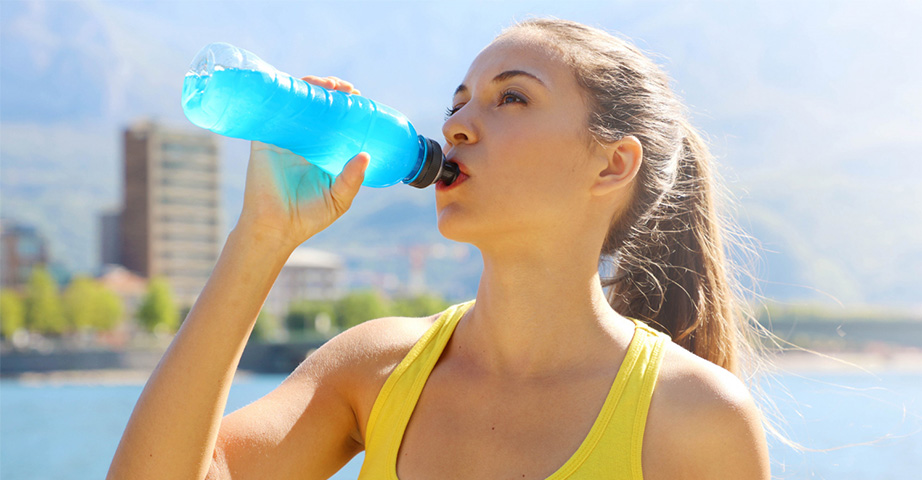Electrolytes - role, sources in food, pharmacy products

Electrolytes are minerals that occur in the body in the form of ions and are responsible for maintaining the body's balance at the most basic levels. Without electrolytes, there is no proper function of the heart, muscles and nervous system. Increased loss of electrolytes from the body occurs when we lose larger than normal amounts of water - with sweat, urine or during diarrhoea and vomiting. Wondering when to reach for electrolytes from the pharmacy and which ones to choose? Find out below!
Electrolytes - what are they and what are their functions??
Electrolytes, in nutritional and health terms, are minerals found as positive and negative ions in blood, sweat and urine. Electrolytes include:
- sodium,
- potassium,
- calcium,
- magnesium,
- chlorine in chlorides,
- chlorine in chlorides,
- bicarbonate.
Recommended electrolytes
Functions of electrolytes in the body
Without the correct level of electrolytes in the body, proper functioning of the body is impossible. Muscle cramps or interference with nerve conduction are the results of disturbances in the number of electrolytes in the tissues. What activities are electrolytes responsible for?
- Functioning of the nervous system - the brain communicates with all cells in the body by transmitting nerve impulses, and this transmission is mediated by electrolytes.
- Correct muscle tone - electrolytes are involved in the mechanisms of muscle contraction and relaxation both during movement and at rest, maintaining correct tension in all body muscles.
- Proper hydration - for the body to be truly hydrated, drinking water alone is not enough. Water must enter the cells and remain in the cell spaces in the correct proportions. Electrolytes are involved in the process of transporting fluids into and out of cells.
- Maintaining the correct pH of the body's fluids - each fluid inside the body has its unique pH (reaction, a measure of the acidity and alkalinity of a solution) depending on what role the fluid plays. Dysregulation of the pH value of body fluids leads to serious health consequences, and electrolytes are responsible for maintaining the correct pH.
Electrolyte deficiency - when does it occur and what does it result in?
Electrolyte deficiency mostly occurs in the case of dehydration. Electrolyte imbalances also accompany some serious medical conditions. In these cases, medical help is required. If we have a slight deficiency we can replenish electrolytes ourselves.
Electrolyte levels in the body decrease as a result of excessive fluid loss leading to dehydration. It can be related to very intense sweating, e.g. when staying in a hot climate, working in the heat, sports in the blazing sun, high fever, vomiting, diarrhoea, or drinking only alcoholic beverages on hot days. This is why it is so important to remember to drink water and provide yourself with electrolytes when experiencing high exertion, high temperatures and gastrointestinal problems.
Insufficient electrolyte levels can cause:
- fatigue,
- increased or irregular heartbeat,
- numbness and tingling in the extremities,
- disorientation,
- weakness and muscle cramps,
- headaches,
- convulsions.
Electrolytes from the pharmacy - which ones to choose?
In case of excessive fluid loss from the body, vomiting and diarrhoea, we often go to the pharmacy for electrolytes, which help prevent the unpleasant and sometimes dangerous consequences of their deficiency. Pharmacies, as well as dietary supplement shops, offer a large selection of electrolytes. The most common are electrolytes in tablets or powdered electrolytes packaged in sachets, which make it very easy to measure the correct dose. Liquid electrolytes are also available in pharmacies, but much less frequently. Electrolytes are available in different flavours, but also in different compositions.
Sodium and potassium and glucose are the basic components of pharmacy electrolytes. Sodium and potassium are the most important electrolytes in the human body and are the basis for defining electrolyte abnormalities in fundamental medical tests. hese two main electrolytes are found in every product - powder and tablets. In some, you can also find other ingredients such as magnesium, chloride, calcium and sometimes vitamin C and selected B vitamins.
Which electrolytes to choose? It is useful to suggest the recommended dose before deciding on electrolytes from a pharmacy.It is much more convenient if a single dose of electrolytes is contained in one tablet or sachet rather than three. Additional electrolytes in the formulation, in addition to sodium and potassium, also benefit the preparation.

Drinking electrolytes and more - home-made electrolytes
It might seem that drinking electrolytes bought at the pharmacy are the only way to provide yourself with these valuable minerals. Nothing could be further from the truth. However, it cannot be denied that buying ready-made drinking electrolytes is the easiest way to replenish electrolyte losses and is strongly recommended for quick response to symptoms of electrolyte deficiencies.
On an everyday basis, all that is needed to take care of healthy electrolyte levels is a proper selection of foods from the diet. Eating vegetables, fruit, avocados, nuts and whole grain products provides the necessary amounts of minerals. Drinking electrolytes can also be prepared at home yourself. Examples of homemade electrolytes include:
- One litre of water with honey, lemon juice and 1/4 teaspoon of table salt,
- Blended melon with watermelon,
- Banana milkshake,
- Coconut water,
- Pomegranate juice.

